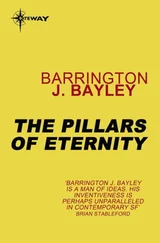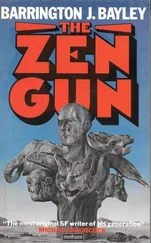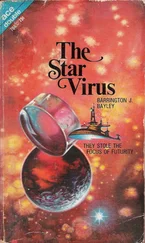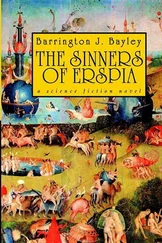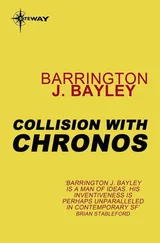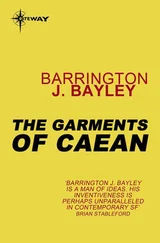He nodded, letting it revert back to a sphere. The test of amorphism was satisfied. The stone had no intrinsic shape. Next he took up a sharp saw-bladed knife and set himself to carve off a portion of it. Although of gemlike hardness in the hand, the stone offered little resistance to the blade, and he sliced off a piece of about an inch in thickness.
The severed portion hit the tabletop, but no longer as the jade-like substance of the stone. It had instantly decomposed into a scintillant red powder.
Amschel well understood this. Divorced from the fundamental unity of the stone, the fragment could not maintain itself and had begun to decay into merely normal states of matter. Already it was compound, partly elemental.
With this powder marvels could be performed. Compounded further, introduced into other substances, it would create a whole new range of efficacious agents.
More important, however, was that when pared the stone had immediately reconstituted itself. It was as if the knife had done no more than slice through water.
The test of wholeness and indivisibility was satisfied.
Amschel lifted the pale green ball and stared straight into its heart. This, then, was the Stone. This was the Tincture, the Most Excellent Medicine, the secret substance of the universe, wrenched out of the hylic realm by a blast of manmade lightning. Gazing upon this wonder, Amschel experienced a supreme joy and exultation. Now he knew that the Hermetic art was real, that the vision of Zosimos was true, that nature applied to nature transforms nature!
This much proved, it remained but to verify one more property of the stone—a little-known property conveyed cryptically, elliptically, in the alchemical code word V.I.T.R.I.O.L.: Visita Interiora Terrae, Rectificando Invenies Occultum Lapidem —“Visit the Interior of the Earth, Through Purification Thou Wilt Find the Hidden Stone.”
Few indeed knew that this formula indicated how the adept may be transformed into a Magus of Power. The earth symbolized the adept’s own body, the place where the Stone could be hidden away from the sight of ordinary man. Amschel moved the Stone. He pressed it to his forehead, between his eyes—and pushed. The Stone moved—inward, passing through skin and bone.
Into Amschel’s brain.
In the Philosopher’s Stone was no differentiation of parts. The Stone was Ultimate Oneness. Immersed in the Stone, the tissues of Amschel’s brain experienced transcendental unity, total access—to one another, and, eventually, to the macrocosm itself.
Amschel’s consciousness was whipped away from the narrow laboratory where he sat. It expanded and expanded, until he seemed to be moving through an endless dark, a dark that was paradoxically filled with light.
The Black Light of the adepts, by which one saw without seeing. Vastness, vastness. And now Amschel perceived the macrocosm.
It was not a place, or region. It was the infinite world system seen from the point of view of totality, endless movement without destination, coming without arriving, going without departing. Man’s reason, evolved in the microcosm, could not grasp the essence of the macrocosm. Even when super-conscious as Amschel’s was, the mind could see it only in terms of entities, signs and symbols, the ancient eternal symbols of alchemy. The mighty Worm Ouroborous, appearing as a vast ring galaxy larger than milliards of galaxies put together, spinning at colossal speed, endlessly devouring and reevolving itself—thus was the macrocosm maintained! The alchemical marriage of King and Queen, conjunction of opposites by which the eternal mystery of merging and separating was brought to pass.
These and other visions of macrocosmic processes blasted into Amschel’s consciousness with such a sense of super-reality that the myriads of worlds flowing away from them seemed mere shadows. Then the direction of his gaze became more specific. He witnessed, as if it lay below him in some multidimensional region so that he saw it from countless vantage points at once—from north, south, east, west, nadir and zenith, externally and internally—the staggering spiral blaze of his own galaxy. He saw, slumbering coiled like a quiescent serpent within the spiraling star arms, the power known as the Sleeping Sulphur, and he saw that this power could, if one knew how, be prodded and disturbed, even, momentarily, awakened.
But he saw, too, that the struggle between man and Kerek, between self-determined consciousness and hypnotized slavery, was of no consequence to nature. It had no place in the macrocosm.
But Amschel did have a place. He was a Magus of Power. He could rotate the elements, converting one substance into another. He could rotate space and time, projecting himself to distant places. He was not governed by number: he could project himself into several different locations at once, unlimited by a single body.
He could, if he chose, disturb the Sleeping Sulphur.
With an effort, Amschel scaled his mind down from the Great World that was not available to him. He was back in the microcosm, sitting in his adamant-lined chamber, the burns on his body beginning to heal.
He had discounted the use of purely physical powers to achieve his long-term mission, but that did not preclude their deployment in a more limited sense, at this juncture, anyway. He must, he decided, arrange some means for his helpers to escape their adamant prison.
Also, he must cover his tracks.
* * *
Four days passed before Wolo could be prevailed upon to lead Rachad and Baron Matello back into the laboratory. The other assistants had come out two days before, but had said little.
As soon as the trio entered the dismal wood, a strong smell of burning reached their nostrils. When they passed through the door of the laboratory, it was to find a spectacle of devastation.
From the look of it a tremendous explosion had spread through the network of chambers, wrecking and charring everything that was not adamant. A penetrating stink, arising from numerous volatile substances, permeated the air; underfoot the floor was slippery with some foam-like stuff—the result, most likely, of the spilling of reactive chemicals.
Wolo moaned, then began to run, slipping and sliding in the mess. Pressing kerchiefs to their faces to ward off the acerbic vapors, Matello and Rachad followed, coming after a few minutes to the infusoratory laboratory where Amschel had sited the great cucurbit for the completion of the work.
Here, evidently the center of the explosion, the destruction was even more complete. With an expression of woe, Wolo looked on an almost empty chamber, practically its whole content being fused into one messy coagulation.
The baron looked about him sourly. “So Amschel’s great experiment was very much a failure after all. Lucky for you he sent you away, or you’d have ended up as dead as he is.”
“But where’s the body?” Rachad said.
“Blown to shreds, and the shreds burned to smoke, I imagine. What’s left of him will be soot, and you’re treading that underfoot. Come along, let’s get back. Later you can sort through all this and see if you can find anything useful.”
“I can hardly believe it,” Wolo intoned emptily. “Years of work—all for nothing!”
“Oh, an alchemist thrives on lost labor!” Matello retorted jovially. He strode from the chamber, Rachad and Wolo trailing reluctantly after him.
Rachad’s heart was heavy as they retraced their steps through the maze. He had not expected this outcome, and it made him feel somber and shaken. In a way it seemed to dash any last vestige of hope—for the Hermetic goal, for the future of mankind, or indeed for his own future.
He no longer believed in the Stone, he told himself. It was all fantasy, and Amschel’s exaggerated claims for it were the dodderings of an old fool. Matello had the right idea: he was a rude realist, unswayed by fanciful notions.
Читать дальше

